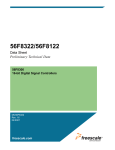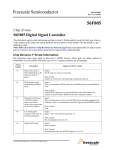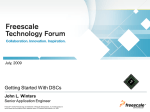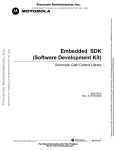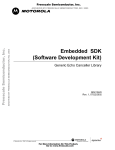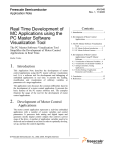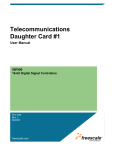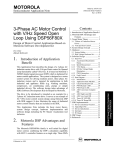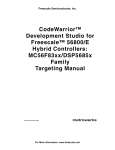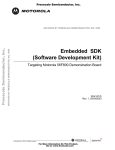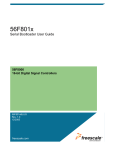Download Embedded SDK 2.0E Release Notes
Transcript
Embedded SDK 2.0E Release Notes New Features: • This version is recommended for use with Metrowerks CodeWarrior for DSP56800E version 2.0. • This version supports the Large Memory Model (LMM), which allows data addresses greater than 64K. Refer to the “DSP56800ESDK Product Brief” to see which drivers and libraries support LMM. See the “DSP56800E Small Memory Model (SMM) to Large Memory Model (LMM) Porting Guide” for details on how the SMM was ported to the LMM. • This version supports the new SEMI peripheral, which replaces the EMI peripheral. The SEMI allows much quicker access to external devices. You can now execute from external RAM at 60 MIPs. Note that this version of the SDK will not support 5685x DSPs with date stamps older than 0233 (33rd week of 2002). • DSP56852 Target: Telephony Library: MFRC2* * Premium Libraries • DSP56858 Target: Telephony Library: MFRC2*, VAD/CNG/DTX* * Premium Libraries Improved Features: • Updated Targeting Motorola DSP56852 Platform Manual. • Updated Targeting Motorola DSP56858 Platform Manual. • The Second Stage SPI Bootloader was updated to allow booting into external RAM. • The SSI Driver for the DSP56852 was modified to correct a timing problem due to the new revision (date stamp 0233 or 0234) of the DSP. This version will also work with the older revisions of the DSP. • The ESSI Driver for the DSP56858 was modified to correct a timing problem due to the new revision (date stamp 0233 or 0234) of the DSP. This version will also work with the older revisions of the DSP. • The TDC1 Driver for the DSP56852 and DSP56858 was modified to correct a timing problem due to the new revision (date stamp 0233 or 0234) of the DSP. This version will also work with the older revisions of the DSP. • The DTMF Generation Library document was updated to better describe the return values. • The PCS Driver was enhanced by adding an option to configure the DRV bit in the BCR register. • The File I/O application was enhanced by allowing the user to change the COM port and by having it display the filename when an error is detected • The QuadTimer Driver was enhanced by having it check for NULL Callback functions and by fixing bugs when configured for qtOneShot, qtPulseOutput, qtFixedFreqPWM, and qtVariableFreqPWM modes • The RFFT and RIFFT functions in the DSP Function Library were enhanced by fixing a “scaling” bug. • The RFFT, RIFFT, CFFT and CIFFT functions in the DSP Function Library were enhanced by fixing a potential “misalignment” bug. • The PC Master Software Driver was enhanced by adding the Recorder functionality • The SPI Driver was enhanced by fixing a compile error when using the SPI_TRANSMISSION_DATA_SIZE, SPI_MODE_MASTER, or SPI_MODE_SLAVE commands • The Timer Services were enhanced to give a more accurate timer. The old timer could have been off by as much as three percent. • The Serial Flash Programmer had to change due to CodeWarrior 2.0 changing the format of the generated S-Records. Data addresses in the S-Record now start at 0x2000000 instead of 0x0200000. Known Issues: • If using both the Codec and SCI drivers, then you must open the Codec driver first, followed by the SCI driver. This is because the SCI pins are multiplexed with the pins used to configure the Codec. Also note that once the SCI device is opened, the Codec cannot be reconfigured. • The RED_LED for the DSP56852 target has been removed from the SDK, due to a conflict with a chip select to external memory on the DSP56852EVM. The RED_LED is still on the EVM; however, the SDK LED Driver does not access it. • The V.8bis and V.22bis demos do not work on the DSP56852EVM or DSP56858EVM, due to insufficient audio levels and a codec sampling frequency of 8000 instead of 7200. They are included as examples of how to implement these demos in case your hardware has sufficient audio levels and valid sampling rates. • The VRLite-1 demo has intermittent problems on the DSP56852EVM, due to real-time issues when running from external RAM. VRLite-1 is currently being optimized so that it can execute on the DSP56852. • The win32 apps for g729ab_file_server (decoder, encoder, and multi_channel) do not work on Windows 98 systems. • The VAD demo sometimes fails due to the PC’s inability to keep up with the DSP when the DSP is writing data to the PC via the serial port. There is no flow control for these applications; thus, the PC cannot tell the DSP to stop transmitting. These tests are more successful when using a faster PC (>700MHz) and minimizing the processes running on the PC. • The following projects fail on the DSP56852EVM when using Global Optimization Level 4: CFFT test and math test. • The following projects fail on the DSP56858EVM when using Global Optimization Level 4: G.723 test and demo, CFFT test, and math test. • The version of SDK described in HTML Help is the version that was last installed. For example, if you install SDK2.5 (for DSP56F80x and DSP56F82x families) followed by SDK2.0E (for DSP5685x family), then HTML Help will describe SDK2.0E. Due to changes in some of the APIs of libraries, it is very important that you use the correct version of HTML Help in order to correctly understand how the API is defined for your target. PDF versions of Help on the CD distinguish between SDK versions (index.html for DSP56F80x and DSP56F82x and index_v2.html for DSP5685x). Previous Releases Embedded SDK 1.6E Release Notes New Features: • This version is recommended for use with Metrowerks CodeWarrior for DSP56800E version 1.1.1. • DSP56852 Target: Bootloaders: Serial Data Flash Programmer, Second Stage SPI Bootloader. BSP Library Drivers for: Telecommunications Daughter Card 1 (TDC1) Codec/DAA, TDC1 Keypad, TDC1 LCD Display, Computer Operating Properly (COP). Tools Library: Cycle Count Tool. Telephony Library: Automatic Gain Control (AGC)*, Noise Suppression (NS)*, Common Tone Generator (CTG). * Security Library: New DES and 3DES real-time demos have been created. Feature Phone Application developed by Telcordia Technologies. Includes Type 1 and Type 2 Caller ID, Type 1-2 Caller ID Parser, Generic Echo Canceller, and Full-Duplex Speakerphone libraries. * * Premium Libraries • DSP56858 Target: Bootloaders: Serial Data Flash Programmer, Second Stage SPI Bootloader. BSP Library Drivers for: Telecommunications Daughter Card 1 (TDC1) Codec/DAA, TDC1 Keypad, TDC1 LCD Display, Computer Operating Properly (COP), Direct Memory Access (DMA), ESSI Driver using DMA, Codec Driver using DMA, Host Interface. Tools Library: Cycle Count Tool. Telephony Library: Automatic Gain Control (AGC)*, Noise Suppression (NS)*, Common Tone Generator (CTG). * Security Library: New DES and 3DES realtime demos have been created. Feature Phone Application developed by Telcordia Technologies. Includes Type 1 and Type 2 Caller ID, Type 1-2 Caller ID Parser, Generic Echo Canceller, and Full-Duplex Speakerphone libraries. * * Premium Libraries Improved Features: • Updated Embedded SDK Programmer’s Guide. • Updated Targeting Motorola DSP56852 Platform Manual. • Updated Targeting Motorola DSP56858 Platform Manual. • Many of the Modem, Telephony, Security, and Speech Libraries were optimized for MIPs and size. • The Codec Drivers for the 56852 and 56858 were modified to correct a potential timing problem when configuring the Codec via GPIO. • The SSI Driver for the DSP56852 was modified to correct a timing problem in which samples read from or written to the SSI could have been missed. • The DTMF Generation Demo for the DSP56852 was corrected due to the Codec and SSI Driver modifications described above. • The CodeWarrior Debugger’s Stack Calling Tree window now works correctly due to fixes in CodeWarrior 1.1 and the SDK. • The default rate of the File I/O application was changed to 9600bps. • The V.22bis library was modified to add an “Auto” mode, which allows the user to disable sending/detecting the 2100Hz answer tone. Known Issues: • This version of the SDK supports only the small data memory model. Please see the CodeWarrior documentation for more details. • If using both the Codec and SCI drivers, then you must open the Codec driver first, followed by the SCI driver. This is due to the SCI pins being multiplexed with the pins used to configure the Codec. Also note that once the SCI device is opened, the Codec cannot be reconfigured. • The RED_LED for the DSP56852 target has been removed from the SDK, due to a conflict with a chip select to external memory on the DSP56852EVM. The RED_LED is still on the EVM; however, the SDK LED Driver does not access it. • The V.8bis and V.22bis demos do not work on the DSP56852EVM or DSP56858EVM, due to insufficient audio levels and a codec sampling frequency of 8000 instead of 7200. They are included as examples of how to implement these demos in case your hardware has sufficient audio levels and valid sampling rates. • The VRLite-1 demo has intermittent problems on the DSP56852EVM, due to realtime issues when running from external RAM. VRLite-1 is currently being optimized so that it can execute on the DSP56852. • The win32 apps for g729ab_file_server (decoder, encoder, and multi_channel) do not work on Windows 98 systems. • The AEC test, VAD demo, NS test, and AGC test sometimes fail due to the PC’s inability to keep up with the DSP when the DSP is writing data to the PC via the serial port. There is no flow control for these applications; thus, the PC cannot tell the DSP to stop transmitting. These tests are more successful when using a faster PC (>700MHz) and minimizing the processes running on the PC. • The following projects fail on the DSP56852EVM when using Global Optimization Level 4: CFFT test and math test. • The following projects fail on the DSP56858EVM when using Global Optimization Level 4: G.723 test and demo, CFFT test, and math test. • The version of SDK described in HTML Help is the version that was last installed. For example, if you install SDK2.5 (for DSP56F80x and DSP56F82x families) followed by SDK1.6E (for DSP5685x family), then HTML Help will describe SDK1.6E. Due to changes in some of the APIs of libraries, it is very important that you use the correct version of HTML Help in order to correctly understand how the API is defined for your target. PDF versions of Help on the CD distinguish between SDK versions (index.html for DSP56F80x and DSP56F82x and index_v2.html for DSP5685x). Embedded SDK 1.5.2E Release Notes New Features: • This version is recommended for use with Metrowerks CodeWarrior for DSP56800E version 1.1. Embedded SDK 1.5.1E Release Notes New Features: • This version is recommended for use with Metrowerks CodeWarrior for DSP56800E version 1.0.1. • Repackaged from SDK 1.5E. Embedded SDK 1.5E Release Notes New Features: • This version is recommended for use with Metrowerks CodeWarrior for DSP56800E version 1.0.1. • DSP56852 Target: BSP Library Drivers for: PC Master, SSI Modem Library: V.42bis* * Premium Libraries • DSP56858 Target: Stationery - • • • • • BSP Library Drivers for: Button, Codec, COP, ESSI, File I/O, GPIO, ITCN, LED, PC Master, PCS, PLL, Quad Timer, SCI, SPI, Serial Data Flash, SIM, TOD DSP Function Libraries System Services Library Tools Library Telephony Libraries: Acoustic Echo Cancellation (AEC), Caller ID, CAS Detect, Call Progress Tone Detection (CPT), DTMF Detection, DTMF Generation, G.165, G.168, G.711, G.723*, G.726, G.729AB*, Voice Activity Detect (VAD) Modem Libraries: V.8bis, V.21, V.22bis, V.42bis* Speech Library: VRLite-1* Security Libraries: DES, Triple DES*, RSA* RTOS Support: uC/OS** * Premium libraries ** Requires purchase of uC/OS source code DSP56853/4/5/7 Targets: Stationery New EVM Hardware User Manual for DSP56858 New DSP5685x 16-Bit Digital Signal Processor User’s Manual New Targeting Motorola DSP5685x Platform Manual An MP3 Decoder Library and Demo for the DSP56858 is now available. Please contact your local Motorola Distributor for a demonstration. Improved Features: • Updated Embedded SDK Programmer’s Guide • Updated Targeting Motorola DSP56852 Platform Manual • The initialization of all drivers is now done statically. The user can still change the driver settings dynamically using ioctl commands. This change required changing the API for the open() call for all of the drivers. • The G.168 API was modified by eliminating the callback function • G.726 was optimized. By doing this, the G.726 Encoder and G.726 Decoder libraries were combined into a single G.726 library. • The implementation of the mono mode of the Codec Driver was changed to reduce the memory and MIPs required. When configured for mono mode, the Codec Driver will only read from and write to the left channel of the Codec. It had previously written to the right channel as well. Known Issues: • This version of the SDK supports only the small data memory model. Please see the CodeWarrior documentation for more details. • If using both the Codec and SCI drivers, then you must open the Codec driver first, followed by the SCI driver. This is due to the SCI pins being multiplexed with the pins used to configure the Codec. Also note that once the SCI device is opened, the Codec cannot be re-configured. • The RED_LED for the DSP56852 target has been removed from the SDK, due to a conflict with a chip select to external memory on the DSP56852EVM. The RED_LED is still on the EVM; however, it is not accessed by the SDK LED Driver. • The V.8bis and V.22bis demos do not work on the DSP56852EVM or DSP56858EVM, due to insufficient audio levels and a codec sampling frequency of 8000 instead of 7200. They are included as examples of how to implement these demos in case your hardware has sufficient audio levels and valid sampling rates. • The VRLite-1 demo has intermittent problems on the DSP56852EVM, due to real-time issues when running from external RAM. VRLite-1 is currently being optimized so that it can execute on the DSP56852. • The AEC test, VAD demo, and G.165 demo sometimes fail due to the PC’s inability to keep up with the DSP when the DSP is writing data to the PC via the serial port. There is no flow control for these applications; thus, the PC cannot tell the DSP to stop transmitting. These tests are more successful when using a faster PC (>700MHz) and minimizing the processes running on the PC. • The following projects fail on the DSP56852EVM when using Global Optimization Level 4: CFFT test and math test • The following projects fail on the DSP56858EVM when using Global Optimization Level 4: G.723 test and demo, CFFT test, and math test • The Host Interface Driver was included with the DSP56858 target, but does not work, due to a silicon problem with the Host Interface. Please see the errata sheet for more details. Embedded SDK 1.1E Release Notes New Features: • This version is recommended for use with Metrowerks CodeWarrior for DSP56800E for version 1.0e Beta 2 and Patch 2.1. • DSP56852 Target: BSP Library for Drivers: File I/O, PCS Telephony Libraries: G.168, Caller ID, CAS Detect, Call Progress Tone Detection (CPT), Voice Activity Detect (VAD) Modem Libraries: V.8bis, V.21, V.22bis Speech Library: VRLite-1 - Security Libraries: DES, Triple DES, RSA RTOS Support: uC/OS Improved Features: • SCI Driver has been optimized for speed and size. • Codec Driver now offers ioctl commands to dynamically change the watermark level of its internal FIFO buffers. The user can also specify different sizes for the Transmit and Receive FIFOs. • All tests now run on the target hardware • Fixed bug in the Stationery where the Library project would not accept asm files • Removed the target specific information from the Library documents (i.e. performance measurements and procedures for demos) and put them in the Targeting Motorola DSP56852 Platform Manual • Updated Targeting Motorola DSP56852 Platform Manual New Drivers New Libraries New Demos Description of the External RAM target Performance measurements Known Issues: • This version of the SDK supports only the small data memory model. Please see the CodeWarrior documentation for more details. • The API to the SCI Driver for the open function has changed from previous SDK releases. The initialization of the SCI Driver is now done statically instead of dynamically. • If using both the Codec and SCI drivers, open the Codec driver first followed by the SCI driver. This is due to the SCI pins being multiplexed with the pins used to configure the Codec. Also note that once the SCI device is opened, the Codec cannot be re-configured. • The COP Driver and COP Application have been included, but have not been tested since they require a stand-alone mode of operation for the DSP (CodeWarrior Debugger not attached). • The RED_LED has been removed from the SDK due to a conflict with a chip select to external memory. The RED_LED is still on the EVM, however, it is not accessed by the SDK. • The v.22bis test project does not work • The g.726 demo is noisy when the target is External RAM • The vrlite-1, CPT, Caller ID, V.8bis, and V.22bis demos do not work due to insufficient audio levels on the 56852 EVM. These demos have been included, though, so the user will have an example of how to use them. • The VAD, G.165, and G.168 Demos sometimes fail due to the PC not being able to keep up with the DSP when the DSP is writing data to the PC via the serial port. There is not any flow control for these applications, thus the PC cannot tell the DSP to stop transmitting. These tests are more successful when using a faster PC (>700MHz). • If projects are changed to use optimization level 4, some tests may begin to fail (i.e. G.726 Test, CAS Detect Test) Embedded SDK 1.0E Release Notes New Features: • This version is recommended for use with Metrowerks CodeWarrior for DSP56800E version 1.0e Beta 2. • DSP56852 Target: BSP Library Drivers for: Button, Codec, COP, GPIO, ITCN, LED, PLL, Quad Timer, SCI, SPI, SSI, Serial Data Flash, SIM DSP Function Library System Services Library Tools Library Telephony Libraries: Acoustic Echo Cancellation (AEC), DTMF Detection, DTMF Generation, G165, G711, and G726 • New EVM Hardware User Manual for DSP56852 • New DSP56852 16-Bit Digital Signal Processor User’s Manual • New Targeting Motorola DSP56852 Platform Manual • Codec Driver now offers callback functions and low-level interface • Removed appconst.c file since CodeWarrior now handles const types. This is a change from previous releases of the SDK for the 5680x and 5682x family of DSPs. • The read and write functions for the Codec, SPI, SCI, and Serial Data Flash drivers changed. They now pass in a parameter, NBytes, instead of Size. NBytes contains the number of bytes to be read or written. This parameter used to contain the number of “elements” to be read or written. This is a change from previous releases of the SDK for the 5680x and 5682x family of DSPs. • Relaxed Pointer Checking has been disabled in all SDK projects Known Issues: • • • • • • This version of the SDK supports only the small data memory model. Please see the CodeWarrior documentation for more details. Due to external memory problems with the current version of DSP56852, only those applications that fit in internal memory have been included. All of the library tests do not run on the target hardware due to not fitting in internal memory. They have been included, but only execute using the Simulator. The API to the Codec Driver for the open function has changed from previous SDK releases. The initialization of the Codec Driver is now done statically instead of dynamically. If using both the Codec and SCI drivers, open the Codec driver first followed by the SCI driver. This is due to the SCI pins being multiplexed with the pins used to configure the Codec. Also note that once the SCI device is opened, the Codec cannot be re-configured. The COP Driver and COP Application have been included, but have not been tested since they require a stand-alone mode of operation for the DSP (CodeWarrior Debugger not attached).









